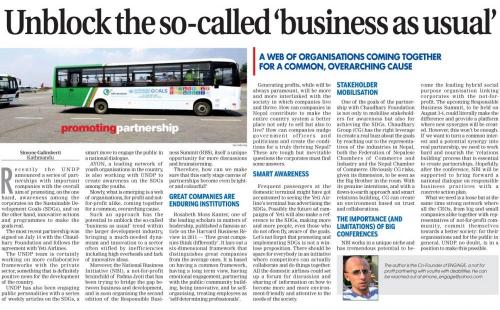
Recently the UNDP has announced a series of partnerships with important companies with the overall aim of promoting, on the one hand, awareness among the corporates on the Sustainable Development Goals, SDGs and on the other hand, innovative actions and programs to make the goals real.
The most recent partnership was signed on July 14th with the Chaudhary Foundation and follows the agreement with Yeti Airlines.
Certainly the UNDP team is working on more collaborative frameworks with the private sector, something that is certainly very positive news for the development of the country.
Moreover UNDP has been engaging public personalities with a series of weekly articles on the SDGs, a smart move to engage the public in a national dialogue.
AYON, the leading network of youth organizations in the country is also working with UNDP to create awareness on the SDGs among the youths.
Slowly, what is emerging is a web of organizations, for profit and not for profit alike, coming together for a common, overarching cause.
While this promising “net” is still being constructed, piece by piece, there is a huge potential if more organizations and companies are reached out and asked to do their own bit to make Nepal a successful case study in terms of SDG achievement.
Such an approach has the potential to unblock the so called “business as usual” trend within the larger development industry, bringing a much needed dynamism and innovation to a sector often stifled by inefficiencies including high overheads and lack of innovative ideas.
Moreover the National Business Initiative, NBI, the not for profit brainchild of Padma Jyoti that has been trying to bridge the gap between business and development, is soon organizing the second edition of the Responsible Business Summit (RBS), itself a unique opportunity for more discussions and brainstorming.
How can we make sure that this early stage canvas of partnerships can become even brighter and colorful?
Great Companies are enduring institutions
Rosabeth Moss Kanter, one of the leading scholars in matter of leadership, published in 2011 a famous article on the Harvard Business Review, “How Great Companies think differently” lays out a six dimensions framework that distinguish great companies from the average ones. It is based on a) having a common framework, b) have a long term view, c) have emotional engagement, d) partnering with the public/community building, e) be innovative, f) be self-organizing, treating their employees as “self-determining professionals”. Working on the SDGs, given their variety in the nature of the goals, offers a great way to put in practice, also internally within a company, some of the above mentioned dimensions that make a great company. Generating profits, while will be always paramount, will be more and more interlinked with the society in which companies live and thrive. How can companies in Nepal contribute to make the entire country system a better place not only to sell but also to live? How can companies nudge government officers and politicians and create the conditions for a truly thriving Nepal? These are tough but inevitable questions the corporates must find some answers.
Smart Awareness
Frequent passengers at the domestic terminal might have got accustomed to see the Yeti Airline’s terminal bus advertising the SDGs. Possibly the future ads campaigns of Yeti will also make a reference to the SDGs, making more and more people, even those who do not often fly, aware of the goals. Let’s not forget that promoting and implementing SDGs is not a win- lose proposition. There should be space for everybody in an initiative where competitors can actually collaborate and do things together. All the domestic airlines could set up a forum for discussion and sharing of information on how to become more and more environmentally friendly and attentive at the needs of society.
Stakeholder Mobilization
One of the goals of the partnership with Chaudhary Foundation is to mobilize stakeholders for awareness but also for achieving the SDGs. Chaudhary Group has the right leverage to create a real “buzz” about the goals by reaching out the representatives of the industries in Nepal, both the Federation of Nepalese Chambers of Commerce and Industry and the Nepal Chamber of Commerce. Obviously Chaudhary Group risks, given its dimension, to be seen as the Big Brother in the room. With its genuine intentions, and with an down to earth approach and smart relations building, Chaudhary Group can create an environment based on trust and collaborations.
The importance (and limitations) of big conferences
NBI works in a unique niche and has tremendous potential to become the leading hybrid social purpose organization linking corporates with the not for profit. The upcoming Responsible Business Summit, to be held on the 3rd and 4th of August, could literally make the difference and provide a platform where new synergies will be created. This won’t be enough. If we want to turn a common interest and a potential synergy into real partnership, we need to work hard and nourish the “relations building” process that is essential to create partnerships. Hopefully after the conference, NBI will be supported to bring forward a national dialogue on responsible business practices with a concrete action plan.
What we need is a loose but at the same time strong network where all the CEOs, from big and small companies alike that together with representatives of not for profit community, commit themselves towards a better society: for their organizations and for the public in general. No doubt that UNDP is in a position to make this possible.










Add new comment